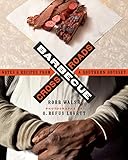Barbecue Crossroads : Notes and Recipes from a Southern Odyssey / Robb Walsh.
Material type: TextPublisher: Austin : University of Texas Press, [2013]Copyright date: 2013Description: 1 online resource (295 p.)Content type:
TextPublisher: Austin : University of Texas Press, [2013]Copyright date: 2013Description: 1 online resource (295 p.)Content type: - 9780292745896
- 641.760975
- TX840.B3 ǂb W35 2012eb
- online - DeGruyter
| Item type | Current library | Call number | URL | Status | Notes | Barcode | |
|---|---|---|---|---|---|---|---|
 eBook
eBook
|
Biblioteca "Angelicum" Pont. Univ. S.Tommaso d'Aquino Nuvola online | online - DeGruyter (Browse shelf(Opens below)) | Online access | Not for loan (Accesso limitato) | Accesso per gli utenti autorizzati / Access for authorized users | (dgr)9780292745896 |
Frontmatter -- Contents -- Preface: Saying Grace -- 1. Pits and Pulpits -- 2. Eat Dessert First -- 3. The Spiritual Home of Barbecue -- 4. Convenience Stores -- 5. Big Pigs and Little Pigs -- 6. Fast Food and Slow Food -- 7. Barbecue Barbarians -- 8. The High Life -- 9. Fresh Air and Parched Peanuts -- 10. Shoulders and Red Dip -- 11. Whole Hog and Old Hickory -- 12. Young Blood -- 13. The Cook-Off Circus -- 14. Community Barbecues -- Acknowledgments -- Bibliography -- Index of Recipes and Food Preparation -- General Index
restricted access online access with authorization star
http://purl.org/coar/access_right/c_16ec
In stories, recipes, and photographs, James Beard Award–winning writer Robb Walsh and acclaimed documentary photographer O. Rufus Lovett take us on a barbecue odyssey from East Texas to the Carolinas and back. In Barbecue Crossroads, we meet the pitmasters who still use old-fashioned wood-fired pits, and we sample some of their succulent pork shoulders, whole hogs, savory beef, sausage, mutton, and even some barbecued baloney. Recipes for these and the side dishes, sauces, and desserts that come with them are painstakingly recorded and tested. But Barbecue Crossroads is more than a cookbook; it is a trip back to the roots of our oldest artisan food tradition and a look at how Southern culture is changing. Walsh and Lovett trace the lineage of Southern barbecue backwards through time as they travel across a part of the country where slow-cooked meat has long been part of everyday life. What they find is not one story, but many. They visit legendary joints that don’t live up to their reputations—and discover unknown places that deserve more attention. They tell us why the corporatizing of agriculture is making it difficult for pitmasters to afford hickory wood or find whole hogs that fit on a pit. Walsh and Lovett also remind us of myriad ways that race weaves in and out of the barbecue story, from African American cooking techniques and recipes to the tastes of migrant farmworkers who ate their barbecue in meat markets, gas stations, and convenience stores because they weren’t welcome in restaurants. The authors also expose the ways that barbecue competitions and TV shows are undermining traditional barbecue culture. And they predict that the revival of the community barbecue tradition may well be its salvation.
Mode of access: Internet via World Wide Web.
In English.
Description based on online resource; title from PDF title page (publisher's Web site, viewed 26. Aug 2024)


